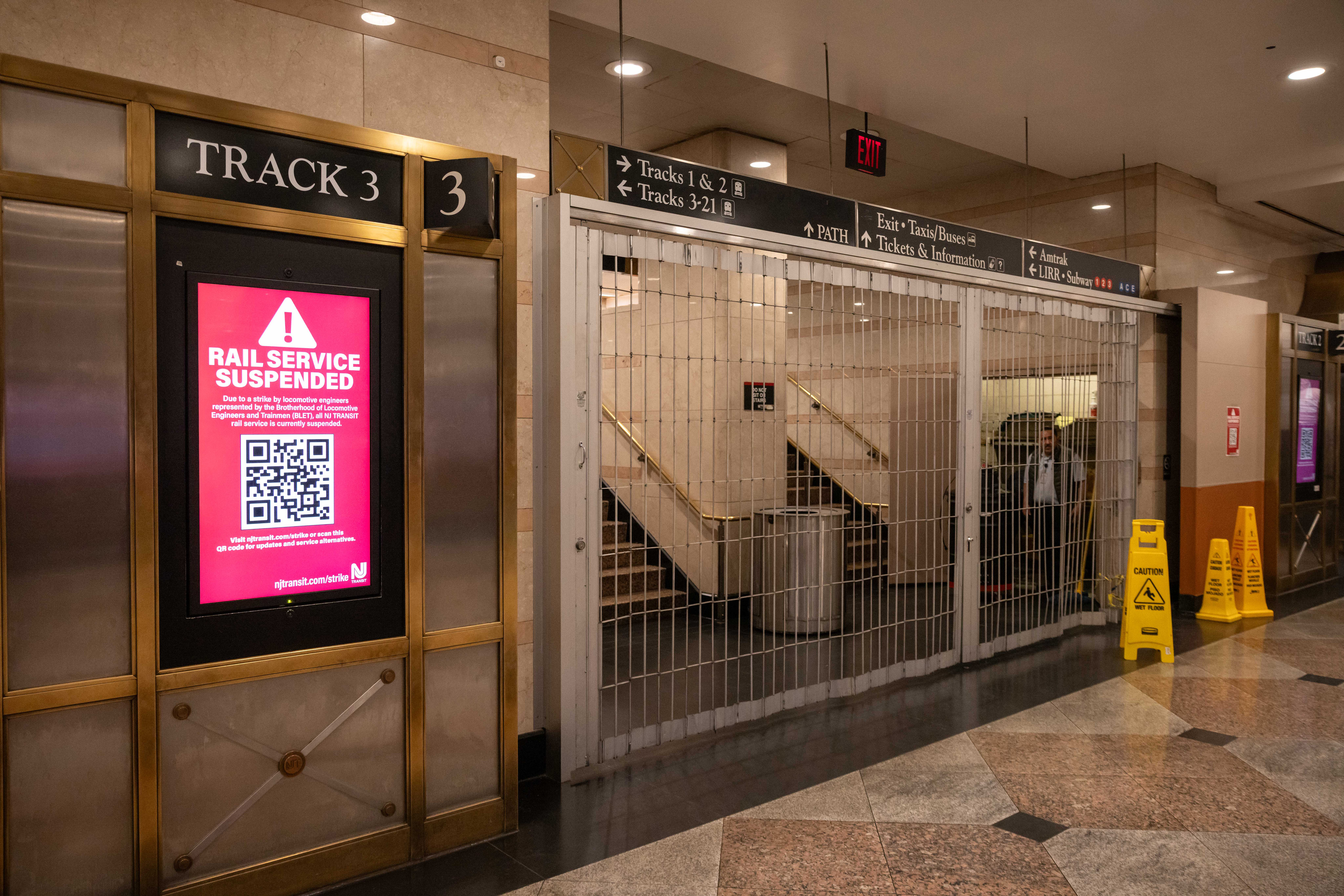NJ Transit Strike: Shakira Concerts & Commute Chaos Imminent!
NJ Transit Strike Looms: Shakira Fans Brace for MetLife Chaos!
NJ Transit on the Brink: A Commuting Catastrophe?
Hold on tight, New Jersey commuters! It looks like we might be heading for a major transportation meltdown. NJ Transit and the Brotherhood of Locomotive Engineers are locked in a tense standoff, and the possibility of a rail strike – the first in decades – is looming large. Can you imagine the ripple effect this could have on daily life?
As if the prospect of widespread commuting chaos wasn't enough, Shakira fans are now facing a serious dilemma. With MetLife Stadium hosting the superstar's concerts this week, and especially with Thursday's show being completely sold out, the potential strike throws a major wrench into travel plans. Let's dive into the details of this developing situation.
Federal Intervention: A Last-Ditch Effort
In a bid to avert disaster, federal arbitrators have summoned representatives from both NJ Transit and the union to Washington, D.C. This is a serious attempt to hammer out a deal before the Friday deadline. The aim is to prevent a complete shutdown of the rail system, something that hasn’t happened since 1983. That's a long time! Let's hope cooler heads prevail.
Strike Preparations: The Inevitable Uncertainty
Despite the ongoing negotiations, it seems like both sides are bracing for the worst. Preparations for a strike are well underway. This includes NJ Transit canceling train and bus service to MetLife Stadium for the Shakira concerts. Think about it: thousands of fans relying on public transport suddenly having to scramble for alternatives. It's like a logistical nightmare waiting to unfold!
Shakira Concert Chaos: A Ticket to Trouble?
No Public Transport: The Shakira Show Dilemma
NJ Transit's decision to suspend service to MetLife Stadium for the Shakira concerts has understandably sparked panic among concertgoers. Many were relying on public transportation, and now they face the daunting task of finding alternative routes, battling traffic, and possibly incurring hefty parking fees. Is this the "Hips Don't Lie" concert experience anyone wanted?
Sold-Out Show Scramble: Thursday's Ticketholders in a Tight Spot
Thursday's concert, being a sold-out affair, is particularly problematic. With potentially thousands of fans scrambling for limited parking spaces and alternative transportation options, the area around MetLife Stadium is likely to become a gridlock. Imagine the scenes: a sea of cars, frustrated fans, and a whole lot of traffic-induced stress.
The Impact of a Rail Strike: Beyond the Concert
Commuter Chaos: Daily Life Disrupted
Beyond the Shakira concerts, a rail strike would have a devastating impact on the daily lives of hundreds of thousands of commuters. Imagine overcrowded buses, packed highways, and significant delays in getting to work, school, or appointments. The ripple effect on the New Jersey economy could be substantial.
Economic Repercussions: A Costly Shutdown
A prolonged rail strike could lead to significant economic losses for New Jersey. Businesses that rely on commuters could see a drop in revenue, and the overall productivity of the state could suffer. The costs of alternative transportation, such as increased fuel consumption and parking fees, would also add up quickly.
Understanding the Union's Perspective: Why Strike?
Key Issues: Wages, Benefits, and Working Conditions
To understand why the Brotherhood of Locomotive Engineers is considering a strike, it's essential to look at their key demands. Typically, these include fair wages, comprehensive benefits, and improved working conditions. They argue that these are necessary to attract and retain qualified engineers, ensuring the safe and efficient operation of the rail system.
A Matter of Safety: Prioritizing the Commuters
For the engineers, it's not just about personal gain. They also argue that their demands are crucial for ensuring the safety of commuters. They advocate for adequate staffing levels, proper training, and reasonable working hours to prevent fatigue and errors. After all, a well-rested and properly trained engineer is essential for a safe journey.
NJ Transit's Stance: Balancing the Budget
Financial Constraints: The Balancing Act
On the other side of the table, NJ Transit faces its own set of challenges. They must balance the demands of the union with the financial realities of operating a large public transportation system. This often means making difficult decisions about resource allocation and budget priorities. It's a constant tightrope walk between providing quality service and managing costs effectively.
Negotiation Strategies: Finding Common Ground
NJ Transit's goal in the negotiations is to reach a fair agreement that is sustainable in the long term. This requires finding common ground with the union on key issues such as wages, benefits, and working conditions. The hope is to avoid a strike while ensuring the continued viability of the rail system.
Alternative Transportation Options: What Can You Do?
Carpooling and Ridesharing: Pooling Resources
If a strike does occur, it's time to get creative with transportation. Carpooling and ridesharing can be great options for reducing the number of cars on the road and sharing the cost of commuting. Consider organizing a carpool with colleagues or neighbors who live nearby.
Buses and Ferries: Exploring Other Routes
While NJ Transit buses may be affected, other bus services and ferry routes could provide alternative options for getting around. Research available routes and schedules in advance to avoid any last-minute surprises. It's all about exploring every possibility!
Working from Home: A Temporary Solution
If possible, consider working from home during the strike. This can help alleviate the pressure on the transportation system and allow you to avoid the stress of commuting altogether. Talk to your employer about the possibility of remote work arrangements.
Staying Updated: How to Follow the Negotiations
Official Sources: Trustworthy Information
To stay informed about the progress of the negotiations and any potential strike developments, rely on official sources such as NJ Transit's website and reputable news outlets. Avoid spreading rumors or misinformation, and always double-check the accuracy of any information you receive. In times of uncertainty, reliable information is crucial.
Social Media: Staying in the Loop
Social media can also be a useful tool for staying updated, but be sure to follow verified accounts and be wary of unverified information. Use social media to connect with other commuters and share information about alternative transportation options.
The Clock is Ticking: Will a Deal Be Reached?
With the Friday deadline fast approaching, the pressure is on for NJ Transit and the Brotherhood of Locomotive Engineers to reach an agreement. The stakes are high, and the consequences of a strike would be significant. Will they find a way to bridge their differences and avert a transportation crisis? Only time will tell.
Conclusion: Navigating the Uncertainties
The potential NJ Transit rail strike presents a significant challenge for commuters, Shakira fans, and the New Jersey economy as a whole. As negotiations continue, it's important to stay informed, explore alternative transportation options, and be prepared for potential disruptions. The situation is fluid, but with a little planning and flexibility, we can all navigate these uncertainties together.
Frequently Asked Questions (FAQs)
- What happens if the NJ Transit workers go on strike?
If NJ Transit workers go on strike, it will result in a complete shutdown of the rail system, impacting hundreds of thousands of commuters. This will lead to overcrowded buses, packed highways, and significant delays in getting to work, school, or appointments.
- Will NJ Transit provide alternative transportation during the strike?
While NJ Transit might try to offer limited alternative services, such as additional buses, these are unlikely to fully compensate for the loss of rail service. Commuters should explore other options like carpooling, ridesharing, and alternative bus or ferry routes.
- How will the Shakira concerts at MetLife Stadium be affected?
NJ Transit has already announced that it will not provide train or bus service to MetLife Stadium for the Shakira concerts due to the strike threat. Concertgoers will need to find alternative transportation methods, which could lead to traffic congestion and parking difficulties, especially for the sold-out Thursday show.
- What are the main issues being negotiated between NJ Transit and the union?
The key issues being negotiated typically include fair wages, comprehensive benefits, and improved working conditions. The union argues that these are necessary to attract and retain qualified engineers and ensure the safe and efficient operation of the rail system.
- How can I stay updated on the NJ Transit strike negotiations?
You can stay updated by following official sources such as NJ Transit's website, reputable news outlets, and verified social media accounts. Avoid spreading rumors or misinformation and always double-check the accuracy of any information you receive.


